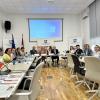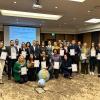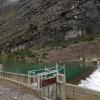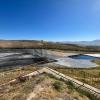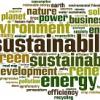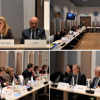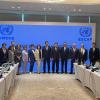News
Displaying Results 1 - 21 of 21
Central Asian countries are actively working towards improving access to water and sanitation. Despite recent progress, Kazakhstan's aging infrastructure, lack of human resources and financial constraints still limit the access of rural population to improved water and sanitation services. In 2022…
Guaranteeing safe access to drinking water and sanitation remains a challenge in the pan-European region, with 16 million people still lacking access to basic drinking water services and over 29 million people not having access to basic sanitation, including hundreds of thousands who have to…
Mining is an important sector and economic contributor in Central Asian countries due to their rich mineral base. However, the mining activities also generate huge amount of waste which can contain hazardous substances and must be safely stored in so-called tailings management facilities (TMFs).…
Uzbekistan is one of the world's largest producers of gold and uranium. In the last 40 years, Uzbekistan has built a strong mining industry, which is expected to grow in the years to come, given that only 20 % of the country’s territory has yet been explored. The expected rise in the number and…
Experts from Albania and Montenegro met in Shkoder (Albania) on 25 April 2023 to progress with the exchange of information on the shared Cijevna/Cem River. This was the second meeting of the joint technical group on monitoring and assessment established upon recommendation of the Implementation…
With its strong mining industry, mountainous areas and high seismic hazards, prevention and preparedness for disasters and climate change adaptation are high on Tajikistan’s agenda. In particular, the increasing frequency and severity of weather events due to climate change can undermine the safety…
UNECE and the European Union continue to support pilot applications of the Strategic Environmental Assessments (SEA) in Belarus and Georgia in the framework of the European Union Water Initiative Plus programme for the Eastern Partnership Countries (EUWI+). SEA is an essential planning tool for…
According to the UNECE Smart Sustainable Cities profile for Tbilisi, presented today in the capital of Georgia, the city has made important efforts in implementing the 2030 Agenda for Sustainable Development, capitalizing on the growth opportunities generated by the Association Agreement between…
While Uzbekistan has improved its environmental performance in line with the Sustainable Development Goals (SDGs) related to water and sanitation (SDG 6) and forests and tree cover loss (SDG targets 15.1, 15.2, 15.3), significant challenges remain related to air quality (SDG 11.6), water resources…
The Fourth Cycle of UNECE Environmental Performance Reviews (EPR) is underway with the fourth review of Montenegro, carried out under the leadership of UNECE.
A large, multidisciplinary team of international experts worked in Podgorica from 22 to 30 April 2024, assessing the environmental…
In the UNECE region, the Fourth Cycle of Environmental Performance Reviews (EPR) kicks off with the review of Tajikistan, carried out for the fourth time under the leadership of UNECE.
A large, multidisciplinary team of international experts worked in Dushanbe from 6 to 15 November 2023,…
While underground coal mining in Albania stopped almost wholly (except for two private mines with a very insignificant output) more than 15 years ago, the abandonment of the mines from the 1990s onwards with no proper plans for closure has left a legacy of risks. These include water contamination,…
Each UN country team develops with the host Government a strategic plan to support national development priorities and strategies. The result is the UN Sustainable Development Cooperation Framework (UNSDCF). The preparation of the UNSDCF begins with a Common Country Analysis (CCA), which provides…
Countries of Central Asia, the Caucasus and Eastern Europe have been hit hard by the socioeconomic impacts of the COVID-19 pandemic, which threatens to derail sustainable development progress in the region.
However, there is also a stronger momentum towards regional cooperation, and countries can…
Turkmenistan has made significant progress in increasing the share of the non-state sector in its GDP (excluding fuel and energy), which reached 71.1% in 2022. Public-Private Partnerships (PPPs) are considered by Turkmenistan as an important tool to further advance the implementation of the SDGs…
Addressing the Tashkent International Investment Forum (2-3 May 2024), UNECE Executive Secretary Tatiana Molcean called for the mobilization of private sector investments to support the implementation of the Sustainable Development Goals (SDGs) and to foster regional cooperation in Central Asia.…
Global goals – just like regional and national goals — can only be achieved if we work together. This is a reason that revitalizing partnerships is at the heart of the Sustainable Development Goals (SDGs).
With this in mind, under the umbrella of the Regional Collaborative Platform, regional…
UNECE is deepening its support to help countries of the region capitalize on innovation to recover from the pandemic and realize the ambitious vision of the 2030 Agenda.
The UNECE Innovation for Sustainable Development Review (I4SDR) of Uzbekistan, which is currently underway, will set out…
At the informal virtual policy dialogue on fashion in Moldova hosted by the United Nations Economic Commission for Europe (UNECE) on 19 May 2021, members of the UN Alliance for Sustainable Fashion and stakeholders of the Moldovan fashion industry came together to discuss the potential of this…
Increasing the use of digital solutions including those developed by the United Nations Centre for Trade Facilitation and Electronic Business (UN/CEFACT) can enhance the sustainability and resilience of supply chains and strengthen global connectivity.
In a series of capacity-building activities…
For some time now, Uzbekistan has been engaged in various activities under the UNECE Convention on Access to Information, Public Participation in Decision-making and Access to Justice in Environmental Matters (Aarhus Convention).
An international round table entitled “Aarhus Convention: Effective…


